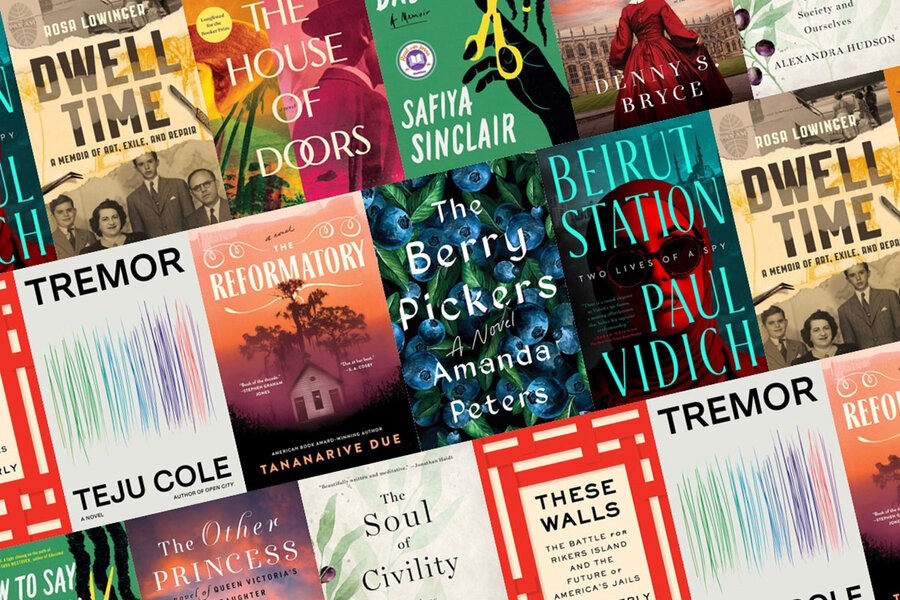Courage, justice, and fortitude: Our favorite October reads
Loading...
The meaning of justice can often feel impossible to crack. In prescient and engaging books, both fiction and nonfiction, authors weave moving narratives as their characters struggle against inequity.
In nonfiction, journalist Eva Fedderly makes a compelling debut with “These Walls,” which focuses on New York’s notorious Rikers Island jail complex, which is scheduled to be replaced with smaller institutions. She deftly considers the history and future of incarceration, and interviews people trying to design more humane jails, as well as prison abolitionists and incarcerated individuals.
Why We Wrote This
A story focused onWhere do we begin in a search for justice? In this month’s books roundup, characters and authors wrestle with this question as they navigate everything from spy craft to incarceration.
And in fiction, Tananarive Due’s harrowing speculative thriller “The Reformatory” tells the story of Robert, who, for trumped-up reasons, is held in a segregated reform school for boys. Robert navigates sadistic administrators and ruthless peers while his sister races to free him from an institution known for abusing its students – particularly its Black ones.
Striking and engaging, these works pull vital lessons from difficult stories.
1 The Berry Pickers
by Amanda Peters
After their youngest daughter, Ruthie, vanishes during a summer of berry-picking in Maine, a Micmac family from Nova Scotia struggles to move forward. Indigenous Voices Award winner Amanda Peters delivers an un-put-down-able novel of identity, forgiveness, and insistent hope.
2 Tremor
by Teju Cole
Why We Wrote This
A story focused onWhere do we begin in a search for justice? In this month’s books roundup, characters and authors wrestle with this question as they navigate everything from spy craft to incarceration.
Tunde, a Nigerian professor living in the United States, grounds Teju Cole’s novel of ideas, moods, views, and questions. A trip to Lagos amplifies a chorus of other voices; they’re quirky and ordinary, sometimes profane, always human. The result is probing – and often revelatory.
3 Beirut Station
by Paul Vidich
Lebanese American CIA agent Analise Assad joins a plot to assassinate a deadly terrorist holed up in Beirut in 2006. She and her partners – a Mossad agent, an old CIA hand, and a journalist – plan and parry. This well-plotted thriller deftly mixes spy craft with questions about identity and justice.
4 The House of Doors
by Tan Twan Eng
This atmospheric novel, set in 1920s Malaysia, tells of a famous author bent on uncovering secrets for storytelling fodder. Tan Twan Eng weaves love, duty, betrayal, colonialism, and redemption into the narrative.
5 The Other Princess
by Denny S. Bryce
A young Black African princess who was orphaned, kidnapped, and enslaved by a rival king goes on to become the goddaughter of Queen Victoria in England. Denny S. Bryce honors the life of the real Sarah Forbes Bonetta with meticulous storytelling, not shying away from the racism and oppression that Sarah encounters.
6 The Reformatory
by Tananarive Due
Tananarive Due’s harrowing speculative thriller – an homage to a family member’s experiences at the notorious Dozier School for Boys – tracks Black siblings as they search for safety and justice in 1950s Florida. Imprisoned in a brutal reform school on cooked-up charges, 12-year-old Robert must survive sadistic administrators, ruthless peers, and specters both benign and tormented, while his sister races to free him. Horrors abound; fortitude wins.
7 The Soul of Civility
by Alexandra Hudson
What can the world’s oldest book teach us about civility today? Alexandra Hudson’s thoughtful and eloquent treatise on how to live well together draws on literature from “The Teachings of Ptahhotep,” written 4,500 years ago in Egypt, to Martin Luther King Jr.’s “Letter From Birmingham Jail.”
8 These Walls
by Eva Fedderly
Journalist Eva Fedderly’s compelling debut focuses on New York’s infamous Rikers Island jail complex, which is slated to be replaced by smaller penal institutions throughout the city. Using this initiative to consider both the history and future of incarceration, she profiles “justice architects” who design humane jails, prison abolitionists, and individuals who are incarcerated.
9 How To Say Babylon
by Safiya Sinclair
Acclaimed poet Safiya Sinclair’s searing and lyrical memoir describes her upbringing in Jamaica in a strict Rastafarian household ruled by her autocratic father. As his dreams of reggae stardom wither, he becomes increasingly rigid and violent; through poetry, she imagines a different life for herself.
10 Dwell Time
by Rosa Lowinger
In this inventive and engaging work, art conservator Rosa Lowinger considers how her professional expertise in repairing damage can be applied to life as well as to art. She traces her Jewish Cuban family’s history, including losses reaching back to the Holocaust and the Cuban Revolution, seeking to understand and to heal intergenerational trauma.







